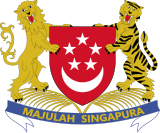| This article is part of a series on |
 |
|---|
|
|

Presidential elections in Singapore, in which the President of Singapore is directly elected by a popular vote, were introduced after a constitutional amendment made in 1991. Potential candidates for office must meet stringent qualifications set out in the Constitution. Certificates of Eligibility are issued by the Presidential Elections Committee (PEC). In particular, the PEC must assess that they are persons of integrity, good character and reputation; and if they have not previously held certain key government appointments or were the chief executives of profitable companies with shareholders' equity of an average of S$500 million for the most recent three years in that office, they must demonstrate to the PEC that they held a position of comparable seniority and responsibility in the public or private sector that has given them experience and ability in administering and managing financial affairs.
The general strictness of the qualifications has resulted in three out of the six presidential elections being walkovers, as presidents S. R. Nathan and Halimah Yacob were the sole candidates to receive a Certificate of Eligibility from the PEC in the 1999, 2005 and 2017 presidential elections. The stringent criteria, the transparency of the PEC's decision-making process and the practice of political parties endorsing candidates have drawn criticism.
Another constitutional amendment was made in 2016, that allows for a presidential election to be reserved for an ethnic community in Singapore if no one from that community had been president for the previous five presidential terms. The ethnic communities in Singapore are categorised into: the Chinese community; the Malay community; and the Indian or other minority communities. Candidates are required to satisfy the usual qualification criteria. The 2017 presidential election was the first reserved election, and was reserved for the Malay community.
The office of President falls vacant upon the expiry of the incumbent's six-year term or if the President is for some reason unable to complete his or her term; for example, due to death (Yusof Ishak and Benjamin Sheares), resignation (Devan Nair) or removal from office for misconduct or mental or physical infirmity, which has yet to happen. If the office of President becomes vacant before the incumbent's term expires, a poll for an election must be held within six months. In other cases, an election can take place any time from three months before the expiry of the incumbent's term of office.
The procedure for elections is laid out in the Presidential Elections Act (Cap. 240A, 2011 Rev. Ed.). The process begins when the Prime Minister issues a writ of election to the returning officer specifying the date and place of nomination day. Potential candidates must obtain Certificates of Eligibility from the PEC, in most cases community certificates from the Community Committee, and political donation certificates from the Registrar of Political Donations stating that they have complied with the Political Donations Act (Cap. 236, 2001 Rev. Ed.). These documents must be submitted together with a nomination paper to the returning officer on nomination day. In addition, by that day, potential candidates must pay a deposit to the returning officer. When only one candidate is nominated, that candidate is declared to have been elected president. Otherwise, the returning officer issues a notice of contested election specifying when polling day will be.
During the election period, a candidate may not spend more than $600,000 or 30 cents for each person on the electoral register, whichever is greater. Candidates may publish election advertising on the Internet, and participate in scheduled television and radio broadcasts. Permits must be obtained to hold election meetings and display posters and banners. A number of acts are unlawful, including bribery, dissuading electors from voting, making false statements about candidates, treating and undue influence. It is also a criminal offence to publish election surveys, and exit polls on polling day before the polls have closed. Legal changes introduced in 2010 made the eve of polling day a "cooling-off day"—campaigning must not take place on that day or on polling day itself.
